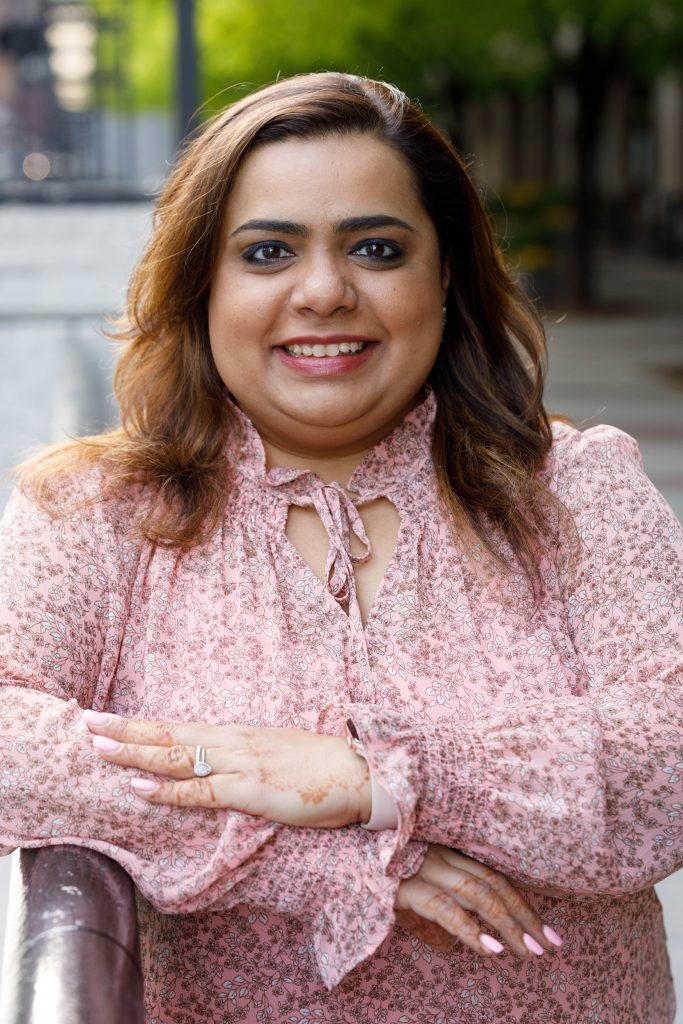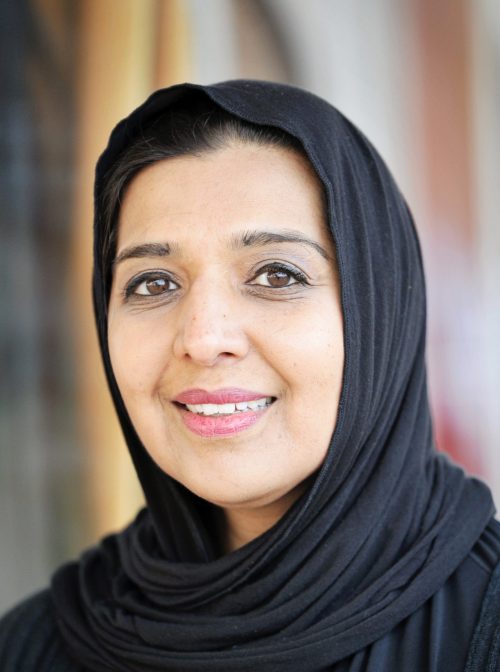This July, I had the honor of interviewing Sumreen Ahmad, a Global Change Management leader and Diversity and Inclusion advocate.
Sumreen was recently recognized as the Employee Resource Group (ERG) Leader of the Year by the Religious Freedom Business Foundation (RFBF), who I met at the Dare to Overcome Conference in Washington D.C. in May 2023.
The stories and examples Sumreen shares are from her own experiences and opinions. This interview has been summarized for brevity purposes.
Fareen Jiwani (FJ): Thank you for being here, can you tell us more about yourself and your inspiration for advocating to bring faith into the workplace?
Sumreen Ahmad (SA): I have been in corporate America for 25 years. I’ve never taken a formal role in inclusion and diversity, but I have been involved with what we now know as inclusion and diversity since about 2000. My professional background is large-scale change transformation and doing cultural change work. I consider the work that we do for inclusion and diversity and more specifically, faith inclusion, to be no different and to be treated with the same imperative as you would any major change journey that you try to roll out in your organization.
I was leading the women’s ERG and saw what “great” looked like from that lens. I was inspired to be able to do the same for faith because that bridges into my personal experience as I am a person of faith.
I have come to realize in my career that my faith actually drives my leadership style, and I would go so far as to say that when it comes to delivering excellence, feeling accountable and responsible for the quality of my work knowing that I am responsible to not just myself but to others around me.
I had a bit of an “aha” moment to say that if I show up every day and want to deliver with excellence it’s because I’m holding myself accountable to a higher power and I bet you there are other people out there that feel the same way, and so I have this added burden of responsibility because I know how to drive change so let me figure out how to be part of the solution.

I have come to realize in my career that my faith actually drives my leadership style.
FJ: Meeting with your values is so important because you’re bringing your whole self to work.
Also, I want to take a moment to congratulate you on winning the ERG Leader of the Year Award from the RFBF and the company you work for, Accenture, being recognized as the number #1 Global 500 faith friendly company by the 2023 REDI Index. What an honor!
Can you share a framework on how to start an ERG for an organization that doesn’t already have one?
SA: When you start anything, you should begin by looking at the end in mind. We live in a very agile world and things are constantly changing and you must plan for risks. There is a methodical process to how to do this:
- What is your burning platform for your change?
- What is it being driven by, and which angle are we coming from and what is really driving this need?
- What does success look like? Where and for whom are you looking to make the most impact and how will you measure that?
It’s about knowing your audience, there are five generations in the workforce now, but the eldest of the five were raised on the principle of “don’t talk about faith, race, religion, politics, etc. because it’s taboo” and then you’ve got the younger generations that asking, “why would you compartmentalize it?” and so it’s a very different workforce right now. There are so many blurred lines, there’s no real “this is where I start my day and end my day” and frankly a lot of people are going to their work for belonging and so [then] you must mesh five different generations and figure out why you’re doing something. So, knowing your “why” is important to your case for change – what is your big, burning platform and how do you address the different demographics from a consistent lens or at least meet people where they’re at.
2) Impact: Next is creating awareness for change. Is it about creating a dialogue to better serve your customers? Or to better support your workforce and create a deeper understanding? It’s important to know what we’re working towards, so it’s “what’s your why” and “what does success look like?”
3) Stakeholders: Next, you want to look at who the different stakeholders are – is your ERG just faith for the sake of faith, for people of faith, or are you looking beyond that and are you looking at all the different faith communities in the organization, are you looking at all leaders? That’s going to vary by company so for a retail company, their stakeholders might actually be their customers that want to present themselves as a company that is religiously diverse and that could attract a different customer base.
4) How far do you want to go? Is it faith or interfaith, or both? There are many ways to approach an ERG and it’s important to really make sure that every faith is equally represented so we’re just going to do interfaith and limit it to that.
5) What does success look like? What’s your impact and who needs to be involved in the journey? In terms of ERGs, you want to make sure that all faiths are represented equally, and do you have enough of the demographics to represent them all fairly?
6) Scope: How do we want to position this? What is your scope? Is it to raise awareness or provide accommodations such as a diverse menu in your cafeteria or a dedicated prayer space? A lot of times, early in your journey, your ERG gets validation when a lot of people come to your event. It is also important that you’re not just advocating for one faith, but have representation from all faiths at the organization, so it can withstand the test of time, and what happens if a large part of the workforce gets laid off, does the entire priority go away too? Down the line, you want to look at, are people comfortable talking about their faith or are accommodations being met?
FJ: An important point that you brought up, was the vaccines and faith communities’ connection. In 2021, Interfaith America created a Faith in the Vaccine network where they provided training, community, and funding to make it possible for faith communities to bring the COVID-19 vaccines to their places of worship. When people are in crisis, one of the places people turn to is their faith community. Can you talk more about this?
SA: Yes, that’s a microcosmic example I was telling you about and what impacts you want to have. I have countless examples, not just at Accenture, but the peer groups that I’ve worked with where organizations turn to their faith ERGs for wellness, corporate citizenship, or marketing strategies just to name a few.
FJ: This has been such a great learning experience. Thank you so much for your time, Sumreen!
SA: Thank you for this opportunity.
Fareen Jiwani is an Emerging Leader who has been involved with Interfaith America for over 19 years.




